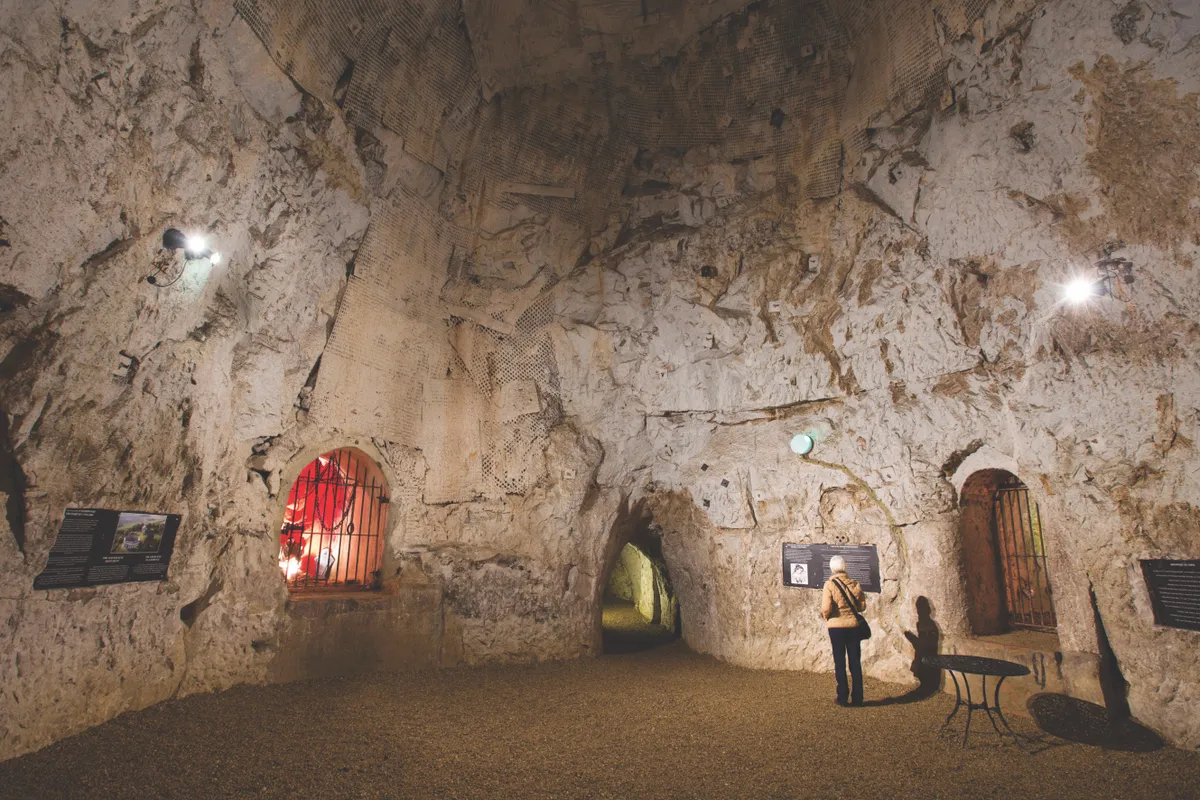The UK is home to a variety of underground caves, caverns, hidden war rooms and secret passages that were used extensively during the first and second world wars.
Our guide to Britain's best underground attractions, including caves, caverns, hidden war rooms and secret passages.
How many caves are there in the UK?
Britain has a vast cave network, with the majority found in the Peak District, Yorkshire Dales, Brecon Beacons and Somerset. It has been estimated that there are more than 60 miles of caves across the country, although there may be more than have yet been undiscovered.
What is caving?
Caving, also known as potholing, involves exploring cave structures using ropes and climbing. It can be a dangerous activity so it is advisable to go with an experienced guide and take safety precautions, particularly in caves filled with water.

Best underground attractions to visit in the UK
Hellfire Caves, Buckinghamshire

Visit the ghost-haunted Gothic archways of Hellfire Caves 100m beneath the Buckinghamshire countryside. The caves’ name derives from that of the Hellfire Club. Originally called the Order of the Friars of St Francis of Wycombe, this meeting of high-society rakes was quite literally forced underground by a commitment to their motto of Fais ce que tu voudras (Do what thou wilt). Yet despite the debaucheries that allegedly took place within these chambers (including pagan rituals), they were originally conceived as a way of providing work for locals who had been hit by disastrous harvests in 1748, 1749 and 1750. The excavated chalk was used to rebuild the road from West Wycombe to High Wycombe.
See our day out at the Hellfire Caves
West Wycombe Caves, Buckinghamshire
Also known as the Hellfire Caves, the series of rooms 90m (300ft0 below ground has a somewhat salacious history. Built in the 18th century they acted as the meeting place and venue for the orgies of the notorious Hellfire Club, presided over by Sir Francis Dashwood, owner of nearby West Wycombe Park. hellfirecaves.co.uk
The Cabinet War Rooms, London
Explore the underground emergency HQ used by Winston Churchill’s government during the Second World War. Work began on the 24,000 square metres of blast-proof rooms, 10m (32ft) below street level, in June 1938 and was completed just prior to the outbreak of war. They were closed in 1945 before reopening in 1984 to the public, along with the Churchill Museum. iwm.org.uk
Gough's Cave, Cheddar Gorge, Somerset
Discovered in 1890 by Richard Cox Gough, Gough’s Cave is a prehistoric cavern with chambers containing a variety of stalactites, stalagmites and rock formations, extending some 1.3 miles at a depth of 90m (295ft0. The cave’s most prestigious treasure is the carving of a mammoth and the skeleton of Cheddar Man, Britain’s earliest known human remains, dating back 7,150 years. cheddargorge.co.uk
Underground Passages, Exeter
Dating from the 14th century and originally built to house freshwater pipes, these medieval passages under Exeter High Street are unique to the city as no similar system of passages can be explored by the public elsewhere in Britain. Open throughout the year. visitexeter.com/things-to-do/exeters-underground-passages
Welbeck Abbey, Nottinghamshire
William John Cavendish-Scott-Bentinck, 5th Duke of Portland, was the eccentric owner of Welbeck Abbey. Living as a recluse, he employed a team of hundreds of workmen to excavate a series of underground rooms, which included a 53m (174ft) long ballroom, a 76m (250ft) long library and a series of tunnels claimed to be wide enough to drive a horse and carriage through – food was even delivered to the duke on miniature railways. Sadly, Welbeck Abbey remains a private home, though you can visit the estate’s farm shop. welbeck.co.uk

